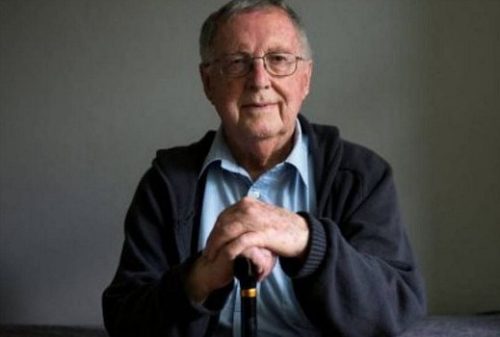Vale former Artistic Director George Ogilvie

Today we remember George Ogilvie, the first Artistic Director of State Theatre Company South Australia from 1972-1976 (formerly the South Australian Theatre Company), who passed away in Braidwood NSW, aged 89.
George’s distinguished career began almost five decades ago with the Canberra Rep Theatre as an actor. Since then he established a prestigious list of credits as one of Australia’s most talented and diverse directors, working in all mediums; theatre, ballet, opera, television and film.
A devoted teacher and mentor, George was known not only for his extraordinary vision, aesthetic and craft but his generous love and support for actors, his deep interrogation of character and his breadth and depth of knowledge of the performing arts in all its iterations. He was also widely known and loved for his sense of kindness, generosity and humility and was an advocate of the benefits of meditation on artistic practice and well-being.
George was born in Goulburn in 1931 in NSW. According to Nick Munro in the Sydney Morning Herald, George “was struck by the stage. He recalls his mother whispering words from Macbeth to her young brood at night: “Tomorrow and tomorrow and tomorrow.”
“I needed to become an actor so badly that during my school years I would lie, cheat, flirt with anyone in order to be part of any performance,” George wrote in his 2006 memoir Simple Gifts: A Life in the Theatre. “My only reality became those moments on stage, performing in front of an audience, becoming someone else.” He put down his pen in the middle of his final taxation exam and walked from the room, living out the dreams of so many chartered accountants. He acted abroad and studied mime in Paris, before settling back in Australia as a stage director – including a stint with the fledgling Melbourne Theatre Company in the early 1960s.
George had many great successes as Artistic Director of State Theatre Company South Australia, directing productions including Jugglers Three, Major Barbara, A Flea In Her Ear, Equus, The Winslow Boy, As You Like It, Journey’s End and Coriolanus. He was responsible for, amongst many things, of moving the company into the Dunstan Playhouse in the new Adelaide Festival Centre in 1974. In this first season George produced, directed, and commissioned a number of Australian plays, something of which he was passionately committed to and actively supported throughout his entire life. Amongst these was David Williamson’s The Department, which was written specifically for the Company and became a national hit.
He fostered the careers of many great actors such as Edwin Hodgeman, Don Barker, Dennis Olsen, Helmut Bakaitis, Vivienne Garrett, Daphne Grey, Patrick Frost, Jacqy Phillips, Barbara West, Paul Blackwell and current Artistic Director of the Adelaide Festival Centre, Douglas Gautier.
George’s television credits included The Dismissal, Bodyline, The Shiralee, Princess Kate, The Battlers, The Feds and Blue Heelers.
Film credits included Mad Max III with George Miller, Short Changed, A Place at the Coast and The Crossing, Russell Crowe’s first feature film.
George regularly taught and directed at NIDA and the Actors Centre in Sydney. He was awarded, among others, the following prizes over his career: a three year Australian Creative Artists Fellowship; the Byron Kennedy Memorial Award from the AFI and three Best Director Awards from the Melbourne Theatre Critics Awards. In 1983 he was made an AM (Member of the Order of Australia) in the Queen’s Birthday Honours List for his services to the theatre and the performing arts.
Many of the actors and artists he worked with have paid tribute to his life and legacy, including Russell Crowe, Noni Hazelhurst, Kate Mulvany, Patrick Frost and Bruce Spence.
——
“He was a shining beacon of kindness and love in a personal and professional world that so often lacked those qualities. It was my absolute privilege and pleasure to work with him, and he set the benchmark as a director very early in my career that so few have lived up to. Forever grateful, and he was right. Kindness is the only way.”
Noni Hazlehurst